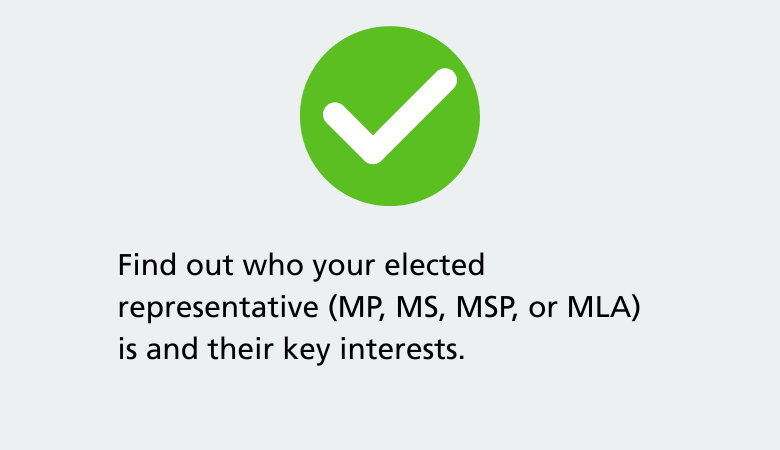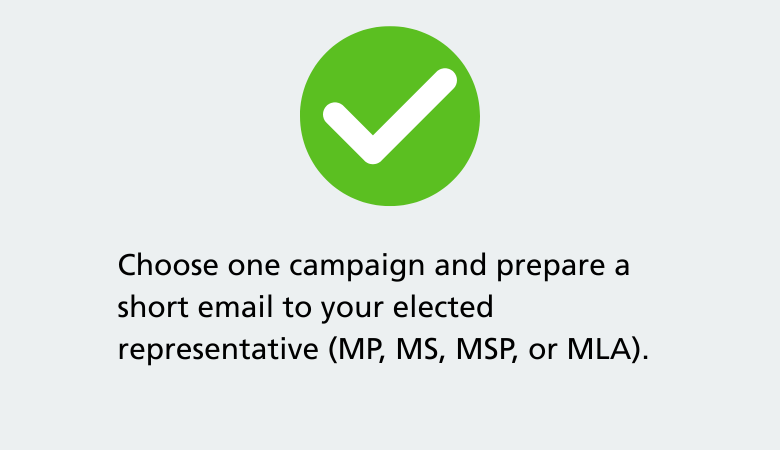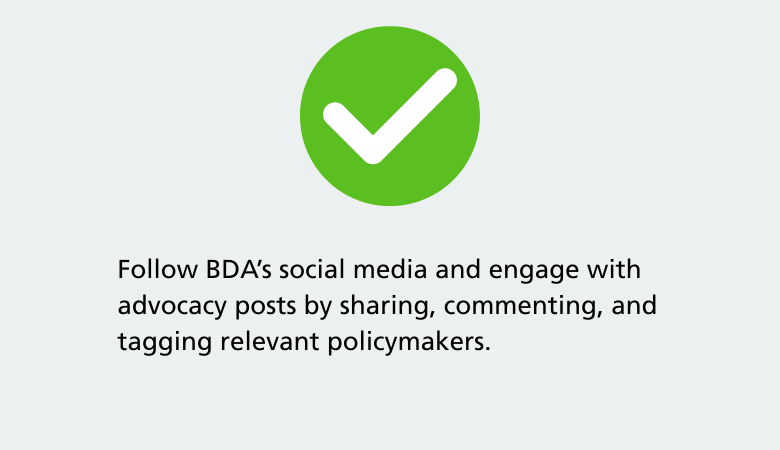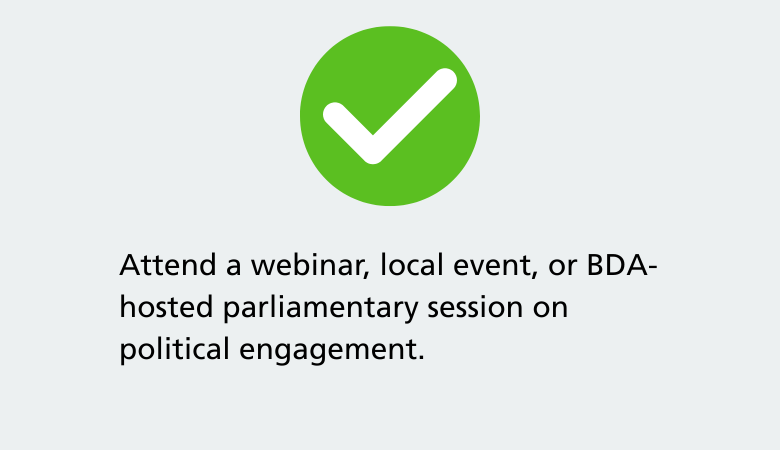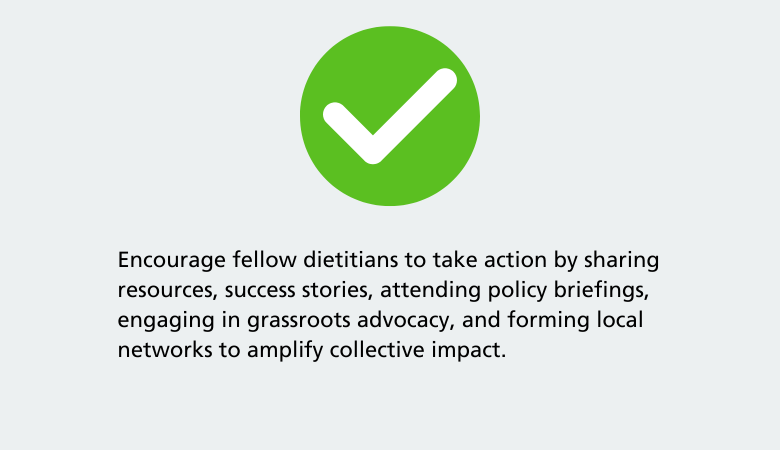Why your voice matters
Dietitians play a crucial role in healthcare and public health, yet too often, decisions that affect our profession and those we support are made without our input.
By actively engaging in political advocacy, we can ensure that our expertise shapes the policies that impact us, our patients, and the wider community.
This toolkit is designed to give you the confidence and practical guidance to engage with politicians effectively, ensuring dietitians’ voices are heard and reflected in policy decisions.
Understanding the political landscape
How government works
- Elected representatives, including MPs, MSs, MSPs, and MLAs, represent their constituents in Parliament and devolved administrations.
- Policy changes happen through consultations, debates, and legislation, with committees playing a crucial role in scrutinising proposals. BDA members can participate by responding to government consultations, submitting evidence to committees, and engaging with MPs MSs, MSPs, and MLAs, highlight the importance of dietetic expertise in shaping policy decisions.
- Decision-makers are most influenced by issues relevant to their constituency.
How does decision-making differ between nations?
Devolution means decision-making is split across the UK. Many health and NHS decisions are made by the devolved governments in Scotland, Wales and Northern Ireland, while Westminster remains responsible for England, and some issues remain reserved to the UK Parliament across all nations.
In practice, that means a change you see locally might stem from national policy or funding choices, from devolved priorities, or from local health board or trust decisions, and often it is a mix. This toolkit helps you work out where the decision sits and aim your message at the right level, with one clear ask and a consistent BDA message.
Why politicians listen to you
- Elected representatives prioritise concerns raised by their constituents.
- Professional expertise strengthens arguments – as dietitians, you bring evidence-based insight into public health, nutrition, and healthcare challenges.
- Coordinated action (e.g., multiple members contacting MPs, MSs, MSPs, and MLAs) increases pressure for change.
Key BDA campaigns and what we’re asking for
Extend free school meal provision to all primary school children
This campaign aims to ensure that all primary school children across the UK have access to a high-quality, nutritious meal every day.
Develop a comprehensive UK Food Strategy
This campaign advocates for the development of a UK-wide food strategy that takes a comprehensive approach to food policy, considering everything from farming and production to nutrition and public health.
Extend independent prescribing rights to dietitians nationwide
This campaign aims to pressure the UK Government into taking the necessary steps to allow our members across all four nations of the UK independent prescribing rights, to deliver the efficient and necessary care that patients deserve.
Strengthening the dietetic workforce
This campaign advocates for a comprehensive, four-nation approach to protecting and expanding the dietetic workforce.
Commit to fair pay for NHS dietitians
The BDA is campaigning for a comprehensive, fully funded pay strategy to underpin the NHS Long Term Workforce Plan.
How to engage with your MP, MSs, MSPs, and MLAs
Find and research your MP, MSs, MSPs, and MLAs
This map lets you check the parliamentary majority in your area, alongside a link to your MP’s TheyWorkForYou page, which highlights both their voting record and parliamentary contributions to date. It’s a useful tool for gauging how likely your MP might be to respond to local campaigning.
|
Why does a parliamentary majority matter when influencing my MP? Some MPs hold their seat with a large majority. Others were elected by just a few hundred, or even fewer votes. In constituencies with smaller majorities, MPs are often more responsive to local concerns, knowing that a small shift in support could cost them their seat at the next election. This doesn’t mean you can’t have influence in a safe seat. But if your MP has a narrow majority, they may be more open to engaging with you, especially on issues that directly affect constituents, like access to dietetic services. |
Simply click on a constituency to get started.
Contacting your MP, MSs, MSPs, and MLAs
Writing an email
- Be concise: Keep it to three or four short paragraphs.
- Make it personal: Explain why the issue matters to you as a dietitian and constituent.
- Include a clear ask: Refer to one of the BDA’s priority campaigns.
- Provide evidence: Attach key facts or anonymised case studies where relevant.
Meeting your MP, MSs, MSPs, and MLAs
- Request a meeting at their constituency office or at Parliament.
- Prepare two or three key points to discuss.
- Be clear on what you want them to do (e.g., raise the issue in Parliament, write to a minister).
- Follow up with a thank-you email reiterating your key ask.
Engaging on social media
↵
- Tag your elected representative (MP, MS, MSP, or MLA) in relevant posts to highlight BDA’s campaigns, share campaign materials, engage in policy discussions, and amplify key messages through targeted advocacy threads.
- Share personal insights on how policies impact patients and services.
- Use campaign hashtags to amplify messages and encourage followers to engage with and share posts. For example, a dietitian could tweet about the importance of expanding independent prescribing rights, tagging their elected representative and using #DietitiansForChange to prompt discussion and visibility.
Taking part in BDA political campaigns
- Sign BDA petitions and support letters to government.
- Attend BDA-organised parliamentary events, such as roundtable discussions, policy briefings, MP/MS/MSP/MLA engagement sessions, parliamentary receptions, committee hearings, select committee evidence sessions, and networking opportunities with policymakers and stakeholders.
- Join campaign actions like coordinated MP/MS/MSP/MLA letter-writing, signing petitions, responding to consultations, participating in digital advocacy initiatives, contributing to parliamentary inquiries, engaging in local advocacy with councillors, and supporting public health awareness campaigns.
- Share your advocacy efforts with colleagues to encourage wider participation.
Quick action checklist







